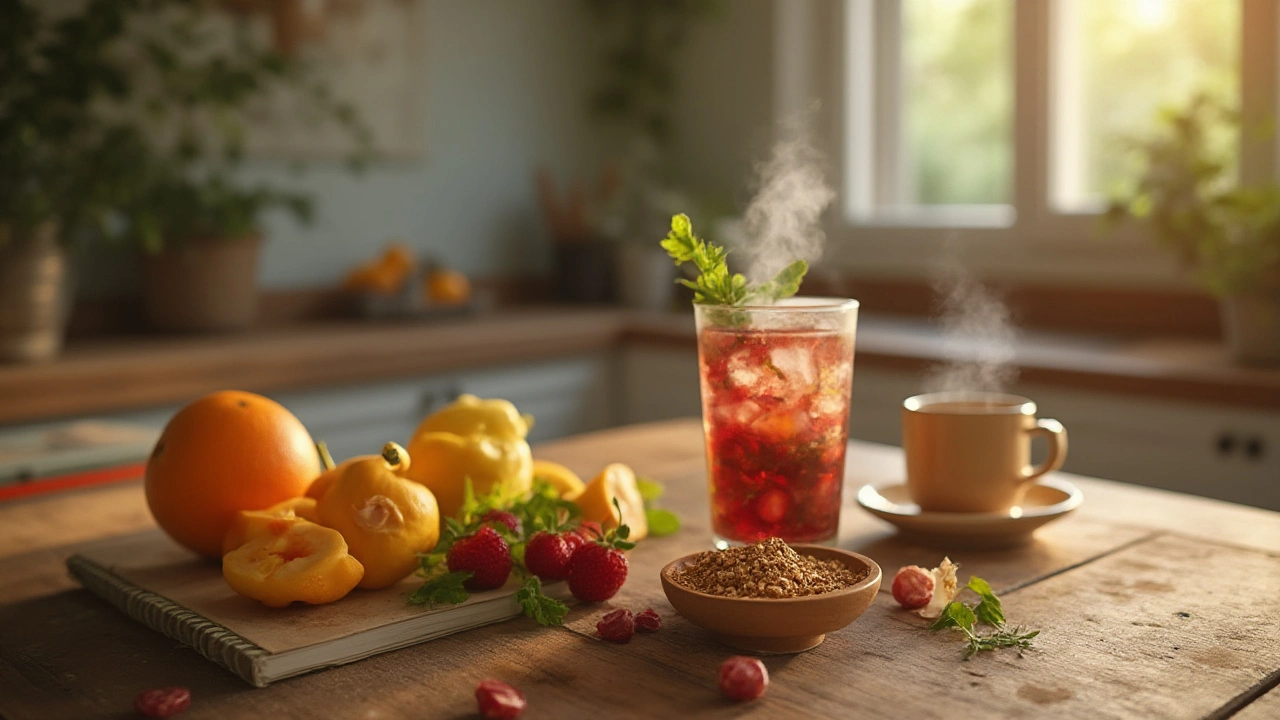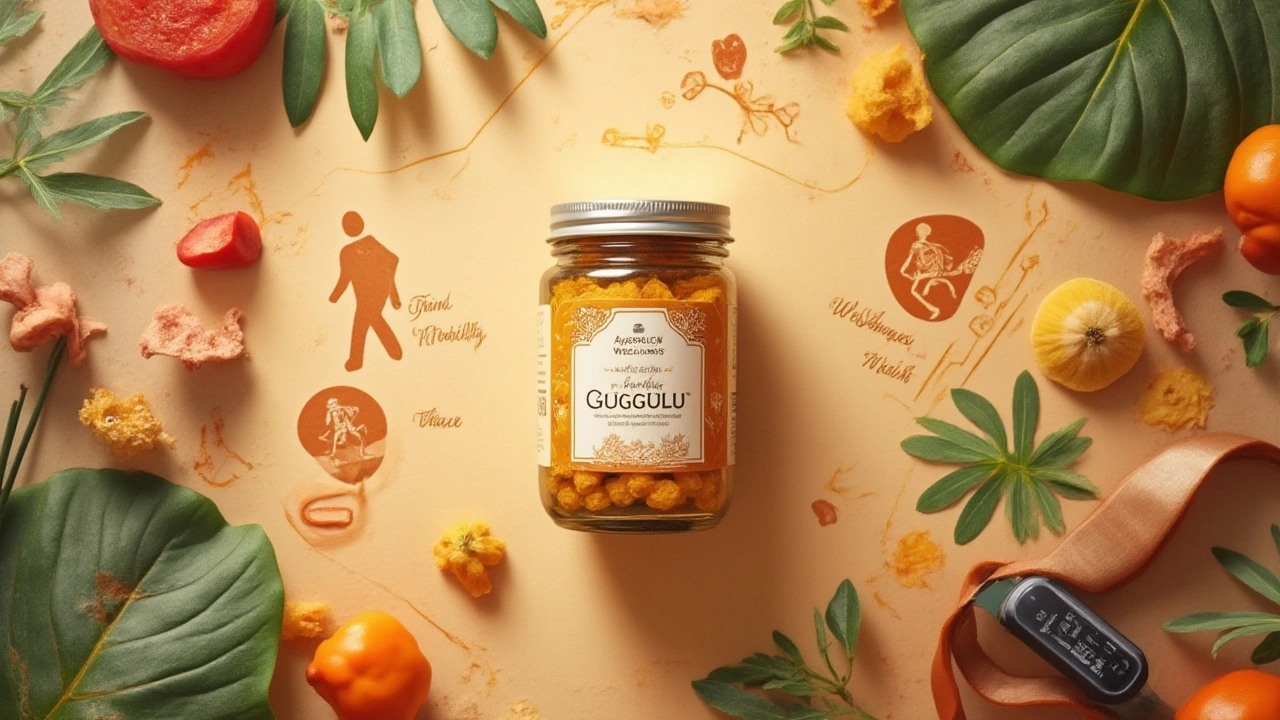Forget what you think you know about ancient remedies—some old-school secrets have teeth, and Shuddha Guggulu leads the pack. This bright yellow gum that oozes from a scruffy Indian shrub has been trusted in Ayurveda long before multivitamins existed. If you ever wondered whether ancient traditions had a clue about modern problems like cholesterol or stubborn fat, let's get into why this sticky resin keeps showing up in everything from herbal capsules to modern health studies.
What is Shuddha Guggulu and Where Does It Come From?
The first thing to get straight—is Shuddha Guggulu just a fun word or a bonafide medicinal powerhouse? Turns out, it's both. It comes from the resin of the Commiphora mukul tree, which grows in the dry, scraggly landscapes of India, especially Rajasthan and Gujarat. The word "guggul" literally means "to protect from disease" in Sanskrit, which tips you off to its reputation in Ayurveda. Guggulu resin looks a bit like golden honeycomb but smells way funkier—a mix of balsamic and bitter, which you'd expect from a plant that oozes its own defense system.
Traditional healers have used this tree sap for thousands of years, describing its power to balance the three doshas—vata, pitta, and kapha. The does-they-really-work part? Guggulu is packed with bioactive compounds, especially guggulsterones. They're what give this resin its influence over everything from fat metabolism to inflammation. What’s important is the shuddha part—"shuddha" means "purified". Raw guggulu isn't used straight from the tree. Healers used to soak it in cow’s urine, then clean and process it with herbal decoctions to remove harsh stuff and boost potency. These days, producers use filtering and other methods to keep it clean and potent, minus the cow urine, thankfully.
The taste isn’t exactly candy-sweet, so few people chew it raw anymore. Instead, it's packed into capsules, extract powders, or combined with other herbs. In India, you’ll find it as the main ingredient in combos like Triphala Guggulu or Yograj Guggulu (yes, they really do love rhyming).
Modern manufacturers have leaped on this tradition with supplement labels promising everything from "detox" to "heart support." Part of the reason Shuddha Guggulu is having a moment again is because more people are looking for alternatives to statins, NSAIDs, and synthetic fat burners. Five years ago, hardly anyone in the UK had heard of it, but after a few clinical studies, you can now find guggulu in health shops even here in Bristol.
And here’s a quirky fact—harvesting the resin is a skill handed down in some Indian communities. They don't just hack up the trees. Instead, they carefully score the bark, harvest the gum, and leave enough for the tree to keep producing. Sustainable wildcrafting is a real point of pride, which means you aren’t just buying a supplement—you're buying a piece of a generational tradition. Some small Indian startups are now even tagging their resin with QR codes so you can trace it right back to the village.

Health Benefits of Shuddha Guggulu: Ancient Wisdom in New Light
The measurables: this sticky resin isn’t just folklore—there’s real research showing how it holds up against things like cholesterol, joint pain, and even sluggish metabolism. The star ingredients, guggulsterones, latch onto cell receptors and seem to nudge body chemistry in surprisingly useful ways.
Let’s start with cholesterol. Back in the 1960s, Indian scientists started checking the cholesterol-lowering claims with animal studies, then with actual people. A study published in the Journal of the Association of Physicians of India (2004) showed that Shuddha Guggulu, taken daily, reduced LDL (bad cholesterol) and triglyceride levels noticeably in patients with moderate hyperlipidemia. For anyone in the UK eyeing their heart health, that’s not just impressive—it’s life-changing.
Then there's weight management. Guggulu seems to crank up the thyroid, making metabolism run a bit hotter. It's not a diet pill by any means, but some trials—like one in the Indian Journal of Medical Research (2009)—have shown guggulu can help nudge the scales in your favor, especially when mixed with Ayurvedic diet tweaks. People often use it in "Triphala Guggulu" blends to help the body detox, shift extra water weight, and break down fat stores—without the crash of coffee or synthetic fat-burners.
Joints get a shoutout too. Guggulu is often combined with herbs like ashwagandha or ginger for people with creaky knees or stiff fingers. Its anti-inflammatory action is partly through reducing cytokines and switching off pain signals triggered by inflammation. If you’re fighting early arthritis or even the aftereffects of a tough workout, there are real user stories claiming a few weeks on guggulu blends make noticeable difference. Compared to over-the-counter painkillers, it works slower but seems gentler on your gut.
For skin, Shuddha Guggulu pops up in Indian acne and eczema formulas. It’s thought to clear toxins and balance immune response that often shows up as breakouts or itchy patches. Rather than drying skin out, it tries to help from the inside—a clever twist that’s won over more than a few herbalists working with tricky skin conditions.
There’s also research around guggulu helping balance blood sugar. It’s not a diabetes cure, but preliminary studies suggest it may make insulin work slightly better—handy if you’re keeping an eye on your glucose.
Here are some handy ways people actually use Guggulu today:
- Capsules standardized for guggulsterones—these go straight into your supplement routine, usually once or twice a day.
- Powder mixed with warm water, as a classic Ayurvedic drink (warning: this tastes bold, not sweet).
- Combined formulas like Triphala Guggulu for detox or Yograj Guggulu for joints.
- Topically as a paste for muscle pains, especially among Ayurveda therapists in India.
When using any herbal supplement, it’s smart to check with a doctor—especially if you’re on meds. Guggulu does interact with blood thinners, thyroid meds, and some anti-inflammatories. High doses can irritate the gut or trigger mild headaches in sensitive types. Stick to a trusted brand since quality can swing wildly between manufacturers—opt for brands who publish guggulsterone content, have third-party testing, or traceability certificates.

Tips for Choosing and Safely Using Shuddha Guggulu
Bringing an ancient remedy into your routine sounds simple, but, as with most natural heroes, there’s a knack for doing it right. The market is peppered with supplements that range from genuinely helpful to outright sketchy, so a little label-reading goes a long way.
The best tip: always look for the “shuddha” version. This means the resin has been carefully purified, getting rid of harsh stuff that can trigger skin or stomach upsets. You’ll usually find this on the label. If you see “standardized for guggulsterones”—even better, as that’s the key active punch.
If you’re aiming to balance cholesterol, most studies used 25-50mg of guggulsterones per day, taken in divided doses. That usually means 500-1000mg whole guggulu resin extract per dose. But everyone’s body—and dose sweet spot—can differ, so starting at the lower end and listening to your body is wise. Some people notice bowel changes or mild headaches at high doses, but these tend to settle within a week if you’re sensitive.
If you’re after joint support, blends that combine guggulu with boswellia or turmeric might give a bigger benefit—Ayurveda calls this “synergistic pairing.” For general wellbeing or mild detox, try Guggulu formulas with triphala or neem—again, blended for wider coverage. If you’re working with an Ayurvedic practitioner, they might suggest bespoke combos based on whether you run more “vata” (dry/cold) or “kapha” (damp/sluggish).
For practical use—take guggulu capsules with food, since the resin is quite strong and can irritate an empty stomach. Drink plenty of water. If you’re prone to acid reflux, stick to lower doses or avoid entirely. Pregnant or breastfeeding mums should steer clear, since research is lacking and some compounds could nudge hormones.
Sourcing matters. Look for certification—organic or wildcrafted labels help ensure minimal pesticides or chemical solvents. UK stores like Holland & Barrett, Planet Organic, or specialist online herbalists often stock decent brands. If you’re on medication (especially cholesterol pills, blood thinners, or thyroid meds), mention your guggulu plans to your GP or a herbal pharmacist. Guggulu can boost the effect of thyroid meds and lower cholesterol drugs, so dosing alongside needs a medical overview.
A few clever hacks to get the most from Guggulu:
- Pair with hot water or ginger tea—heat seems to speed up resin absorption.
- Cycle the herb—use for 6-8 weeks, then break for 2 weeks to prevent overuse.
- Don’t drown in hope-hype; use realistic expectations—herbs nudge rather than slam body systems.
- Keep a diary—track energy, mood, skin, and digestion shifts.
People sometimes ask, is guggulu vegan? The resin itself is plant-based, but some traditional formulas are purified using milk or ghee. If you're vegan, check the fine print or pick a plant-purified brand.
This resin may not fix every health woe instantly, but for many, it offers a surprisingly robust, time-tested option that earns its spot among today’s top herbal supplements. If you’re hunting for something between synthetic meds and placebo herbs, shuddha guggulu might be worth a closer look.








Posts Comments
Michael Waddington July 10, 2025 AT 00:24
Alright, I have to say this Shuddha Guggulu thing sounds like another one of those herbal fads, but then again, Ayurvedic stuff usually has some solid backing from history, right? I mean, it's touted for heart, weight, and joint health — that's a pretty broad range. I wonder how much scientific evidence there really is behind these claims. Has anyone tried it and seen real benefits? Or is it just a placebo effect combined with some good marketing?
Also, the word "Shuddha" means purified or something like that, yes? So the preparation process must be important here. I’m curious if the purification makes it safer or more effective compared to raw Guggulu forms.
Anyway, would love to hear some real talk from someone who's used this stuff or knows a bit more about its chemistry.
April Rios July 10, 2025 AT 01:24
Oh, dear Michael, I appreciate your skepticism but there is so much more here than just ancient tradition. Let me enlighten you! Shuddha Guggulu isn’t just some random herb. It’s a powerhouse with an ancient lineage, backed by the timeless wisdom of Ayurveda, which is essentially holistic science!
When you dive deeper, you find it has anti-inflammatory properties, lipid-lowering effects, and even detox qualities. The purification process — the "Shuddha" part — is crucial to remove toxicity and make it therapeutic without harm. This is not placebo; it's a beautifully orchestrated natural remedy that modern science is starting to appreciate.
If you want, I can share some research articles and personal experiences. Embracing such ancient knowledge could be a spiritual journey as well. Life is more than pharmaceutics, you know.
byron thierry July 10, 2025 AT 02:24
G’day folks, just swinging in with a formal yet warm perspective here. From a cultural ambassador’s standpoint, Ayurveda and its components like Shuddha Guggulu offer invaluable insight into integrative medicine. While Western medicine frequently focuses on isolated symptoms, Ayurveda addresses systemic balance.
Scientifically speaking, the efficacy of Guggulu has been supported by a number of clinical studies showing benefits in lipid metabolism, anti-inflammatory effects, and joint health improvement. However, it is essential to ensure the herb is properly purified and sourced from reputable suppliers.
This dialogue is important because it bridges the gap between traditional and modern paradigms. I encourage a responsible approach in adopting such supplements.
bob zika July 10, 2025 AT 03:24
Greetings, everyone. In adding onto the valuable comments made already, I’d like to emphasize the importance of dosage and consultation with a healthcare professional before starting Shuddha Guggulu. While its benefits are indeed promising, improper usage could lead to adverse effects.
There is a lot of quality control concern with herbal supplements these days, so verifying the purity and authenticity cannot be overstated. Furthermore, patients with certain conditions or those on medications must be cautious.
Undoubtedly, it is a fascinating supplement with roots that run deep, but caution remains paramount.
M Black July 10, 2025 AT 14:21
Hey hey! Just wanted to pop in and say I’ve been using Shuddha Guggulu for joint pain and gotta say, it’s been a game changer! 🙌 I seriously felt improvement after a few weeks. The key is consistency and combining it with other Ayurvedic practices like yoga and a good diet.
Plus, it’s natural so I feel better about taking it long term compared to some heavy meds. I know it’s not magic but when you commit, you can totally notice the difference.
Would recommend anyone curious to at least give it a try with guidance. Stay positive y’all! 💪
Sidney Wachira July 10, 2025 AT 21:26
Okay, hold up a sec. Before we all jump on the Shuddha Guggulu train like it’s the next godsend, where’s the undeniable proof? I've seen so many "miracle" herbs come and go, and the hype usually outpaces the facts.
Sure, historical use is cute and all, but get me double-blind placebo-controlled trials — none of that vague 'traditional knowledge' stuff. Otherwise we're just indulging in wishful thinking.
Anyone got legit science or is this just another trendy health fad? 🤔
Aditya Satria July 11, 2025 AT 19:57
Thank you all for the fascinating discussion so far. Let me add a couple of points that might be helpful for everyone considering Shuddha Guggulu. While traditional uses are important, modern evidence hints at its powerful anti-inflammatory and hypolipidemic properties. But the outcomes rely heavily on standardized preparations.
As a grammar buddy but also a science enthusiast, I must stress the importance of precise usage instructions and recognition of potential interactions. For instance, people with thyroid issues should be particularly cautious. Always consult a qualified Ayurvedic practitioner or physician before starting.
Additionally, practitioners often combine Shuddha Guggulu with other herbs to potentiate the effects, so context matters.
Joanne Myers July 17, 2025 AT 01:31
Adding a note from a highly formal perspective, the phrase "unlocking ancient Ayurvedic benefits" indeed evokes the rich heritage of holistic medicine. However, it is imperative that users approach such substances with a scientific mindset as well as respect for tradition.
For those considering Shuddha Guggulu, verifying product certification and purity is essential. The therapeutic claims for cardiovascular and joint health have basis but remain adjunctive therapies rather than primary treatments.
Therefore, integration into a comprehensive health plan is recommended for best outcomes.
rahul s July 20, 2025 AT 21:31
Man, I gotta say this Shuddha Guggulu hype sounds like a colorful jungle of claims aimed at the naïve. You get all this talk about detox and heart health but no solid punch to back it. Yeah, Ayurveda is rich and all, but let’s not pretend everything ancient is gold.
If people want quick fixes, they’re better off hitting the gym and cleaning up their diet than relying blindly on some herbal magic dust. It’s time to be real, not delusional. If someone’s gonna tout benefits, show me the research, or better yet, the actual outcomes from reliable clinical trials.
Otherwise, it’s just dreamy nonsense conflicting with modern science.
Jocelyn Hansen July 24, 2025 AT 20:17
Hi everyone! Jumping in to lighten up the discussion a bit 🙂. I totally get the skepticism but as someone who's coached clients through alternative approaches, I’ve seen Shuddha Guggulu work wonders for some folks. The key is personalized assessment and patience.
Ayurvedic herbs aren’t a magic pill, they’re part of a larger lifestyle approach. I encourage people to stay curious and open-minded but also critical and informed. Combining it with mindfulness and proper medical advice is a great way forward!
Let’s keep sharing experiences and learning from one another! 🌟
Michael Waddington July 26, 2025 AT 06:44
Thanks all for sharing your perspectives — it’s really cool to see such varied takes. I’m especially interested in the points around purification and standardization. That sounds like where the real magic or problem lies.
Does anyone know good brands or sources for genuine Shuddha Guggulu? And for those who have tried it, how long before you noticed any changes? Trying to weigh whether it's worth adding to my routine or just another herb to ignore.
Write a comment